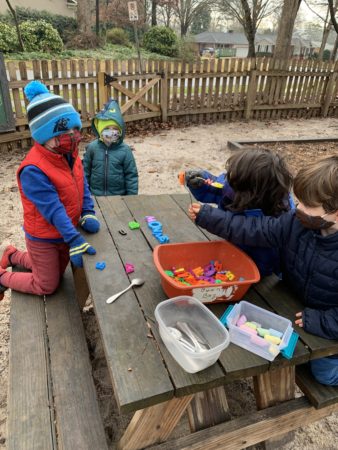
Our classroom has a steady, hummy feel to it in the mornings. Your children enter, greet friends and teachers, and dig into the work of childhood—exploration! We adults are excited to see children learning as they play, and most of us want to join in, perhaps in fond remembrance of our early days. We’re often quite eager to share with them what we know.
However, there’s a fine line between imparting helpful information and interfering with the child’s exploration of materials. Some adults may think it’s fun and educational to demonstrate play dough techniques such as worm rolling and snowman crafting. For example, nifty drawing with crayons by adults is entertaining to a child. One might also conclude that when an adult demonstrates the art of bridging in the block corner it would be useful for a preschooler.
Unfortunately, adult modeling (showing how) robs a child of the chance to discover creativity on her own, in her own good time. It doesn’t teach these skills. Modeling does train a child to wait, to follow directions, and to follow someone else rather than think of one’s own ideas.
Most of us are aware of the scribble stage that children go through with art. They need time to “scribble” with sand, blocks, and other materials as well. A young child playing with blocks for the first time will probably enjoy piling them and moving them around the room. The child is getting a sense of the blocks’ weight and feel. Later comes stacking and placing side by side. There are decisions to be made here. With enough opportunity to experience the blocks, the children will discover on their own that by placing a block lengthwise across two other blocks they have built a bridge. What joy! What a great satisfaction!
A well-meaning adult may build a structure with blocks that pleases the child. But what frustration the child may feel as she tries to reproduce it. The child has been robbed, for the block building has become something to watch, not do.
Children who are allowed to explore materials freely grow up to be creative thinkers and problem solvers. Their creativity is not stifled because they do not stumble over the thought, “What am I supposed to do with this? I don’t have any ideas.” Creative children work to please themselves, not to please someone else. They grow up to be our thinkers, our doers.
Of course, we still want to join in their play, and we can if we follow their lead. Poke the play dough, and sift the sand, but don’t call the shots.
This article, formerly “Helping that Doesn’t Help, but Hinders,” is a revised version of a letter written by an Open Door teacher Gillian Travell to the parents of her class, edited by Sue Riley.